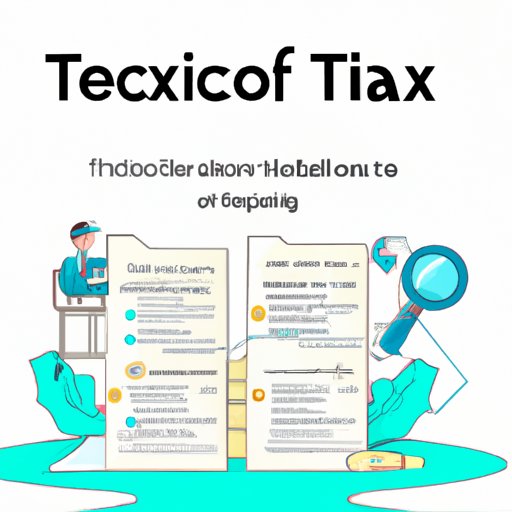Introduction
Cryptocurrency mining is the process of verifying and adding transactions to the blockchain ledger in exchange for a reward. As the popularity of cryptocurrencies continues to grow, so does the number of people interested in understanding how crypto mining is taxed. This article provides an overview of the tax issues surrounding crypto mining and examines the rules and regulations for cryptocurrency taxation in the U.S.
Explaining Crypto Mining Taxation in the U.S.
In the United States, the Internal Revenue Service (IRS) has established specific guidelines for how cryptocurrency should be taxed. According to the IRS, cryptocurrencies are treated as property, not currency, and are subject to capital gains tax. In other words, any profits made from crypto mining must be reported as income on your tax return.
The IRS also requires that all crypto transactions be reported and that taxpayers keep accurate records of their crypto activities. This means that crypto miners must track all of their crypto-related expenses, such as hardware costs, electricity bills, and other related costs, in order to accurately report their profits and losses.
When it comes to taxes on crypto mining profits, there are two main types of taxes that miners need to be aware of: short-term capital gains tax and long-term capital gains tax. Short-term capital gains tax applies to profits earned within one year, while long-term capital gains tax applies to profits earned over one year.
Additionally, forks, airdrops, and initial coin offerings (ICOs) can have an impact on the taxes owed on crypto mining profits. Forks occur when a blockchain splits into two separate chains, while airdrops involve the distribution of free coins to holders of another cryptocurrency. ICOs are fundraising events where investors buy tokens or coins in exchange for a stake in a project.
Examining Different Tax Treatment for Crypto Mining Profits
When calculating taxes on crypto mining profits, it’s important to understand the difference between short-term and long-term gains. Short-term gains are taxed at ordinary income tax rates, which range from 10% to 37%, depending on your income level. Long-term gains are taxed at a lower rate, ranging from 0% to 20%, depending on your income level.
Forks, airdrops, and ICOs can also impact the taxes owed on crypto mining profits. Forks are treated as taxable events and must be reported on your tax return. Airdrops are treated as taxable income and must be reported on your tax return as well. ICOs are treated as investments and any profits earned must be reported as capital gains.

A Guide to Determining Taxes Owed on Crypto Mining Profits
To determine the amount of taxes owed on crypto mining profits, you first need to calculate your gross income from crypto mining. To do this, add up all of your crypto mining revenues, including any rewards received from mining pools, and subtract any associated expenses, such as hardware costs, electricity bills, and other related costs. The resulting figure is your gross income from crypto mining.
Next, you’ll need to deduct any applicable expenses related to crypto mining. Examples include the cost of hardware, electricity, software, and other related costs. You can also deduct any fees paid to exchanges or trading platforms, as well as any losses incurred due to the sale or exchange of cryptocurrencies.

How to Maximize Tax Benefits of Crypto Mining
There are a few ways to maximize the tax benefits of crypto mining. One way is to invest in equipment that is tax deductible. This includes computers, GPUs, and other hardware used for crypto mining. You can also employ strategies to reduce your taxable income, such as offsetting losses with gains and taking advantage of tax credits.

Analyzing the Tax Implications of Crypto Mining Around the World
It’s important to note that the tax requirements for crypto mining vary by country. In some countries, such as the U.S., crypto mining is taxable, while in others, such as Japan, it is not. Additionally, global tax treaties may impact the taxes owed on crypto mining profits, so it’s important to familiarize yourself with the specific tax laws of your country.
Understanding Tax Requirements When Selling Crypto Mined Coins
When it comes time to sell crypto mined coins, it’s important to understand the tax implications. All profits earned from the sale of crypto must be reported as capital gains on your tax return. It’s also important to keep accurate records of all crypto transactions, as these will be needed to calculate the taxes owed.

Navigating the Complexities of Crypto Mining Tax Laws
Crypto mining taxation can be complicated, and it’s important to understand the rules and regulations that apply to your situation. Keeping accurate records of all crypto activities is essential for determining the taxes owed. Additionally, it’s recommended that you consult a professional tax advisor to ensure that you are meeting all of the necessary tax requirements.
Conclusion
Taxes on crypto mining profits can be complex, but understanding the rules and regulations is essential for properly reporting income and ensuring compliance with tax laws. By keeping accurate records and consulting a professional tax advisor, miners can maximize the tax benefits of crypto mining and remain compliant with all applicable tax laws.
(Note: Is this article not meeting your expectations? Do you have knowledge or insights to share? Unlock new opportunities and expand your reach by joining our authors team. Click Registration to join us and share your expertise with our readers.)
